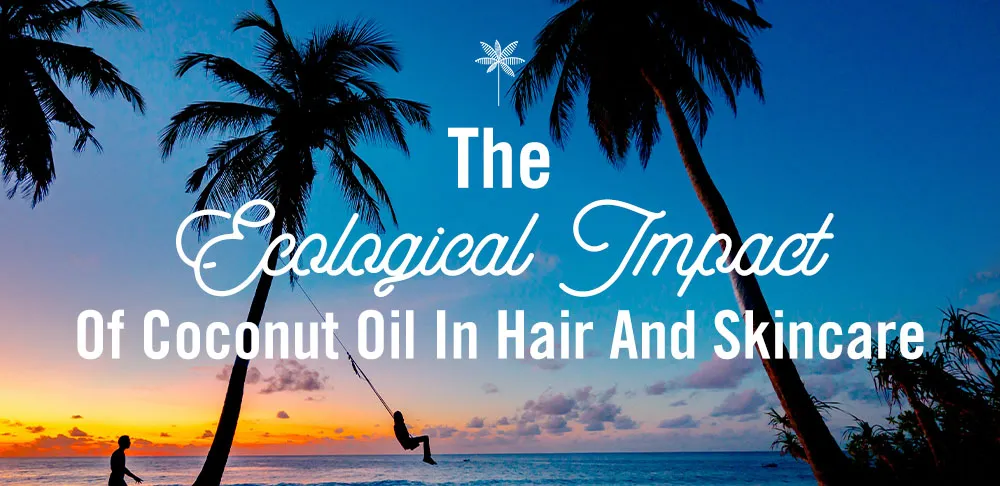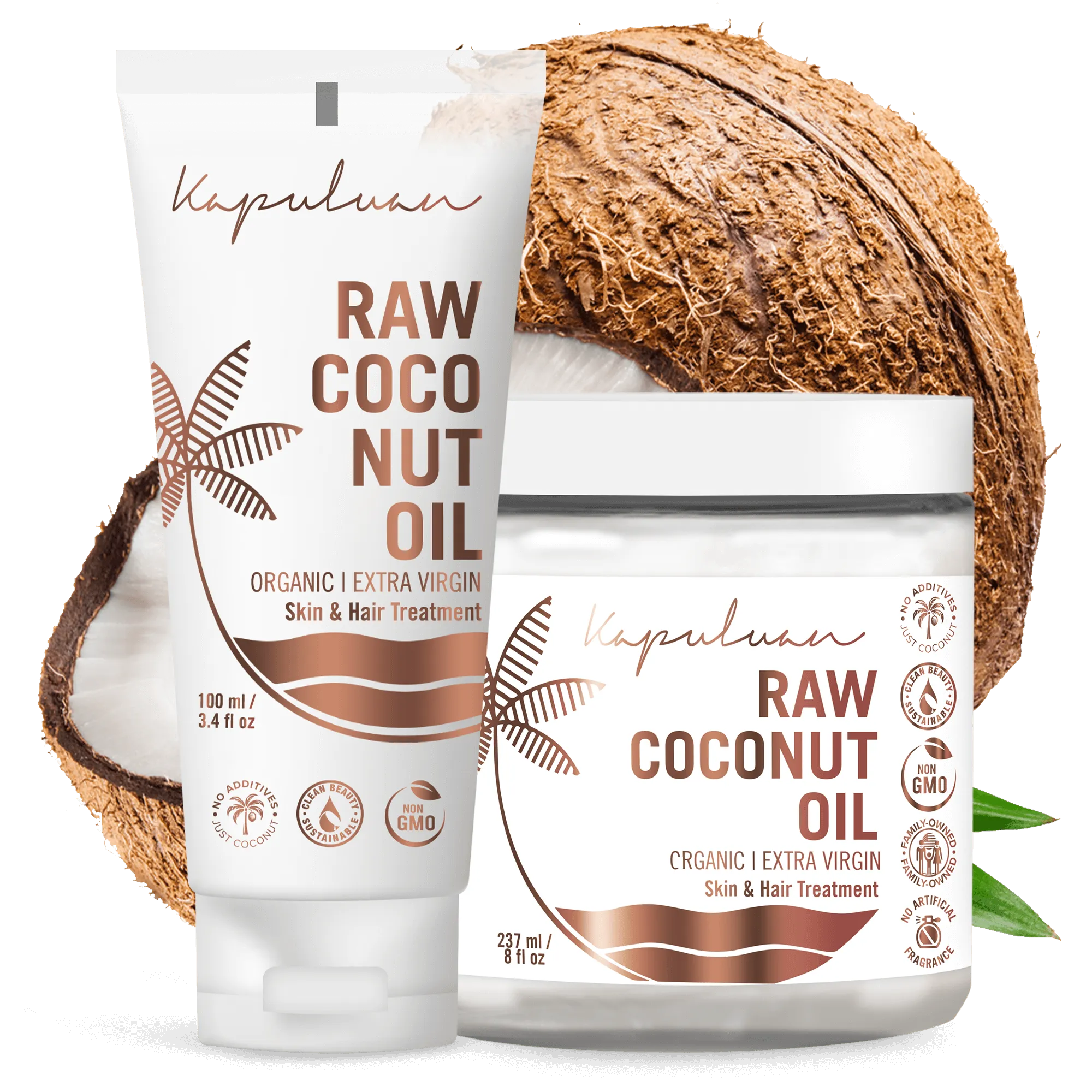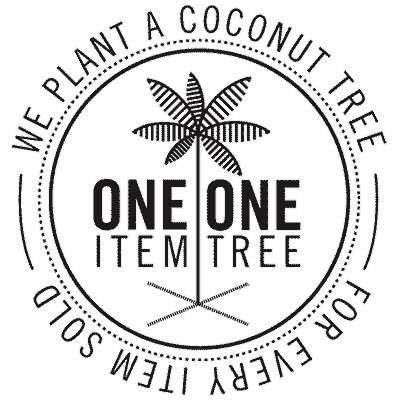We’re all privy to the hype that surrounds coconut oil – its myriad of uses in hair and skincare, its touted health benefits, and its status as a superfood. It’s no surprise that it’s become a staple in many of our routines. From lotions, shampoos, and conditioners to even cooking oils, we’ve made it an integral part of our lives without truly understanding the ecological cost it bears. We love what coconut oil does for us, but at what expense is this love affair with coconuts happening?
Our blindness towards these costs has led to devastating impacts on our environment. Coconut plantations are causing deforestation at alarming rates; pesticides used in their farming are wreaking havoc on local wildlife and biodiversity; the carbon footprint from coconut oil production is enormous; and let’s not forget about the social implications faced by those working within this industry. We must step back and question – Is our quest for beauty products contributing to an uglier reality? It’s time we explored sustainable alternatives because freedom isn’t just about choosing what goes into our bodies or onto our skin – it’s also about knowing these choices aren’t harming the world around us.
Key Takeaways
- Coconut farming for oil production leads to deforestation and loss of biodiversity.
- Excessive pesticide use in coconut production has health and environmental hazards.
- Coconut oil production contributes to the destruction of wildlife habitats.
- Consumers have a responsibility to question the environmental cost of their coconut-based products.
Understanding the Popularity of Coconut Based Products
It’s no secret that coconut-based products have taken the beauty world by storm, and honestly, who can resist their tropical allure? We’re enamored with the alluring scent of these products – it’s like being whisked away on an exotic vacation. But beyond just their intoxicating aroma, there’s a lot to love about these miracle workers from nature. Coconut oil nutrition is a key reason behind its popularity; loaded with beneficial fatty acids, antioxidants, and vitamin E, it is a potent nourishing agent for both skin and hair.
We adore the product versatility which coconut oil brings to our beauty regimen. From providing deep hydration as a body moisturizer to acting as an
effective makeup remover or even serving up some glossy shine when applied lightly to hair ends – we’re hooked! This incredible adaptability makes coconut oil a standout in our skincare routines. Plus, it’s natural and free from harsh chemicals – freeing us from synthetic components’ shackles.
But there’s more than meets the eye here. Being passionate about beauty also means caring for our planet – it gifts us with such fantastic ingredients! The use of coconut-based products not only benefits us but also has significant ecological implications. It promotes sustainable farming practices in regions where coconuts are grown extensively, contributing positively towards biodiversity preservation and local economies. So while we luxuriate in its tropical goodness, let’s also remember how choosing coconut oil affirms freedom – freedom from harmful additives for us and freedom for Mother Earth from destructive agricultural practices.
The Environmental Cost of Coconut Farming
Cultivating copious crops of coconuts can carry a considerable cost to our planet’s precious places and species. The demand for coconut oil in hair and skin care products has led to an explosion in coconut farming across tropical regions, with significant environmental implications. Coconut Harvesting Techniques often involve clearing large areas of land, which disrupts ecosystems and threatens biodiversity. Moreover, the extensive use of pesticides and fertilizers contaminates water sources, contributing to soil degradation and harming marine life.
We must also consider the
impact on Farmer Livelihoods, with many coconut farmers stuck in a cycle of poverty due to low market prices and exploitative trade practices. These farmers often lack access to education about sustainable farming practices, which could help mitigate some of the environmental damage caused by coconut cultivation. Additionally, they are frequently forced into monoculture farming – growing only coconuts – which erodes soil fertility over time and makes their livelihoods more vulnerable to market fluctuations.
Recognizing these issues is crucial to continue enjoying our favorite coconut-based products without causing undue harm to our environment or those who produce them. We can support change by opting for fair-trade products that ensure farmers receive a fair wage, supporting initiatives that teach sustainable agriculture techniques in producing countries, or reducing our consumption altogether. This way, we don’t just protect our planet but also contribute towards creating a world where freedom from exploitation is not just a dream but an achievable reality for all—coconut farmer or otherwise.
Consequences of Deforestation for Coconut Plantations
Deforestation’s heavy toll for the sake of vast coconut plantations doesn’t just strip our planet of its rich biodiversity. Still, it also uproots local communities and disrupts their traditional ways of living. The quest for ever-more land to grow this ‘miracle’ crop brings a host of negative impacts, from soil degradation to the loss of habitat for countless species. There’s a fundamental imbalance in plantation politics, where short-term gains are prioritized over long-term sustainability and community welfare.
| Impact |
Details |
Emotional Appeal |
| Soil Degradation |
The excessive cultivation depletes the soil nutrients leaving it barren and unable to support any other form of life. |
Imagine standing on a once fertile land now reduced to dust under your feet. |
| Loss Of Biodiversity |
Forest habitats are destroyed to make way for monoculture plantations leading to the extinction of many species. |
Think about losing treasured wildlife forever because we value superficial beauty needs more than ecological balance. |
| Disruption Of Local Communities |
Traditional farming practices are replaced by large-scale operations which take away locals’ livelihoods. |
Picture having your way of life uprooted overnight, your means of survival snatched away from you. |
We’re not saying we should stop using coconut oil altogether; far from it! But we need a paradigm shift towards sustainable farming methods that aren’t so destructive and exploitative in nature. We have an obligation as consumers – as human beings – to question where our products come from and at what environmental cost they’re produced. The freedom lies in choosing organic or fair-trade labels and understanding the dynamics behind them – peeling back the layers until we reach the truth beneath each glossy surface hiding harsh realities like soil degradation or plantation politics.
The Role of Pesticides in Coconut Production
Imagine walking through a vast plantation, the air heavy with the smell of chemicals that keep pests at bay; this is another hidden reality behind your favorite tropical products. The coconut oil in your hair mask or skincare cream may have come from these very trees that are doused with pesticides to protect them from infestations. However, while we enjoy the benefits of these products, we need to understand our role in this ecological story. Most countries have some form of pesticide regulation, but enforcement can be inconsistent and often weak, especially in developing nations where most coconuts are grown. This means harmful substances could not only be infiltrating our beauty products but also causing significant harm to local ecosystems.
The pesticides used on coconut plantations can pose serious health hazards for those working there and for nearby communities whose water sources may become contaminated. Pesticides can leach into the soil and water table, disrupting entire aquatic ecosystems and decimating populations of beneficial insects and other non-target species. It’s crucial that we’re aware that many ingredients in our daily routine come at a cost higher than just dollars; they contribute to an industry that has far-reaching negative impacts on both people and the planet.
We believe there’s a better way forward – one that prioritizes health over profit, sustainability over convenience. By supporting companies that source their ingredients responsibly, we can help shift the market towards more eco-friendly practices. Let’s strive toward choosing organic or sustainably-sourced coconut oil whenever possible – because every purchase is a vote for the kind of world we want to live in: one where beauty doesn’t compromise the well-being or freedom of future generations!
Impact on Local Wildlife and Biodiversity
It’s devastating to realize that the lush habitats of countless creatures are being wiped out in the pursuit of our everyday products. One such product is coconut oil, a staple in many hair and skincare routines. But behind our shiny locks and glowing skin lies a darker reality – an ecological disaster characterized by wildlife displacement and biodiversity loss.
- The destruction of natural habitats for coconut plantations leads to significant wildlife displacement:
- Animals like orangutans, elephants, tigers, and a multitude of bird species are losing their homes. They often wander into human settlements searching for food and shelter, which can end tragically both for them and humans.
- Coconut farming also contributes to biodiversity loss:
- When diverse ecosystems are converted into monoculture plantations, we lose animal species and native plants. These plants play crucial roles in maintaining soil health, regulating water cycles, and providing habitat for insects and smaller organisms.
- What’s more alarming is this trend shows no signs of slowing down:
- Unless conscious choices are made by consumers worldwide, demand for coconut oil will continue to drive habitat destruction.
We’ve painted quite a grim picture here, but we must face these realities head-on if we’re truly committed to preserving our planet’s precious biodiversity. We have the freedom to choose – let’s use that power wisely! By consciously choosing sustainable brands or reducing our overall consumption of
coconut oil-based products, each of us can make a meaningful contribution toward mitigating this environmental crisis. Remember: every small action counts when it comes to conserving our world’s amazing array of life forms. So let’s start today; let’s start now!
Carbon Footprint of Coconut Oil Production
You, my friend, might not see it directly, but the invisible shadow of your choices weighs heavily on our planet – each bottle of that smooth elixir you love so much leaves behind a carbon footprint larger than any Bigfoot could ever make. The production process involved in creating that glossy and fragrant coconut oil for your hair and skincare involves several stages: from the coconut harvesting methods to the oil extraction processes. Each of these stages contributes significantly to greenhouse gas emissions. Coconut farms often replace diverse ecosystems leading to deforestation, directly impacting our planet’s ability to absorb CO2. Additionally, the machinery used in farming and transportation burns fossil fuels adding more CO2 into the atmosphere.
Next time you’re shopping for that luscious coconut oil product, we’d like you to consider something. Let’s take a look at this table:
| Stages |
Carbon Emissions |
Potential Solution |
| Coconut Harvesting Methods |
High (due to the use of machinery) |
Implement sustainable practices |
| Oil Extraction Processes |
High (due to energy consumption) |
Invest in energy-efficient technologies |
| Transportation & Distribution |
High (burning of fossil fuels) |
Localize supply chains or offset emissions |
This table shows how different stages contribute differently towards carbon emissions and suggests potential solutions for reducing their impact. We need companies who are willing to invest in cleaner technologies and sustainable practices at every stage.
We don’t want you to feel guilty about nourishing your body with nature’s bounties; instead, we want everyone to make informed decisions about what they consume. We must ask ourselves if there’s a possible way for us all to have healthier skin and hair without causing harm to Mother Earth. Yes! What if brands could be transparent about their coconut harvesting or oil extraction methods? Or better yet, what if we, as consumers, started demanding this information? This is not just about saving our environment but also about liberating ourselves from mindless consumption habits. Remember, every choice counts – let yours count towards a greener future!
Social Impacts of the Coconut Industry
While enjoying the benefits of your favorite products, have you ever paused to consider the lives affected by their production? As we indulge in our choice of
coconut oil-infused hair and skincare products, it’s essential to delve into the social impacts these industries can harbor. Like any other, the
coconut industry is not immune to labor exploitation. In many parts of the world where coconuts are grown and harvested – think regions like Indonesia, Philippines, or India – workers face grueling conditions with meager pay. We must demand transparency from brands about their sourcing practices; this way, our support doesn’t inadvertently contribute to unfair working conditions.
Community displacement is another grave issue that often lurks in the shadows of large-scale agricultural production. Picture this: lush green landscapes turned into monoculture plantations as far as the eye can see, all for our insatiable appetite for coconut oil. Local communities lose access to food-growing land while biodiversity suffers a severe blow. The irony is that while we seek freedom through our purchase choices – freedom from harmful chemicals or synthetic ingredients – those who help bring these natural products onto our shelves may be losing their fundamental freedoms.
So let’s make a conscious choice to ensure that our pursuit for healthier skin and hair doesn’t come at an unjust price for others. We need to push companies towards ethical sourcing and fair trade practices because every product purchase is essentially a vote cast for the kind of world we want to live in. After all, isn’t true beauty about harmony – with ourselves and with everything around us? Please remember this when you next reach out for your favorite coconut oil-infused product; let’s ensure it’s not just good but also right!
Sustainable and Ethical Alternatives to Coconut Oil
In the quest for a beauty routine that’s both kind to your body and mindful of those who produce our favorite products, consider alternatives like
sustainably-sourced shea butter or olive oil. For instance, ethically-produced argan oil from Morocco is gaining popularity due to its incredible moisturizing properties and the fact that its production supports local women’s cooperatives, fostering economic independence in these communities. Not only does this contribute positively to their livelihoods, but it also promotes social development without compromising environmental sustainability.
|
Olive Oil Benefits |
Hemp Seed Potential |
Argan Oil Advantages |
| 1 |
High in antioxidants |
Rich in fatty acids |
Supports women cooperatives |
| 2 |
Promotes skin health |
Promotes hair growth |
Excellent moisturizer |
| 3 |
Sustainable resource |
Environmentally friendly farming practices |
Sustains Moroccan economy |
Beyond being a staple in many kitchens around the world, olive oil has been used as a natural skincare remedy for centuries. Its high antioxidant content can help protect your skin against aging and damage from free radicals. Meanwhile, hemp seed potential is not to be overlooked either – rich in essential fatty acids like Omega-3 and Omega-6, which are known for promoting hair growth and maintaining scalp health. Plus, it’s produced through environmentally friendly farming practices, adding another feather in its cap.
As we journey on this path towards more sustainable beauty regimes, let’s remember that every choice we make impacts someone somewhere in the world – often far away from us. Let’s choose wisely, then, favoring products like olive oil with its multitude of benefits or exploring the untapped potential of hemp seeds over traditional coconut oil when possible. Let’s embrace options such as argan oil, too; knowing each purchase helps support economic independence among local women co-operatives without causing undue harm to our delicate ecosystem. Now isn’t that an empowering thought?




